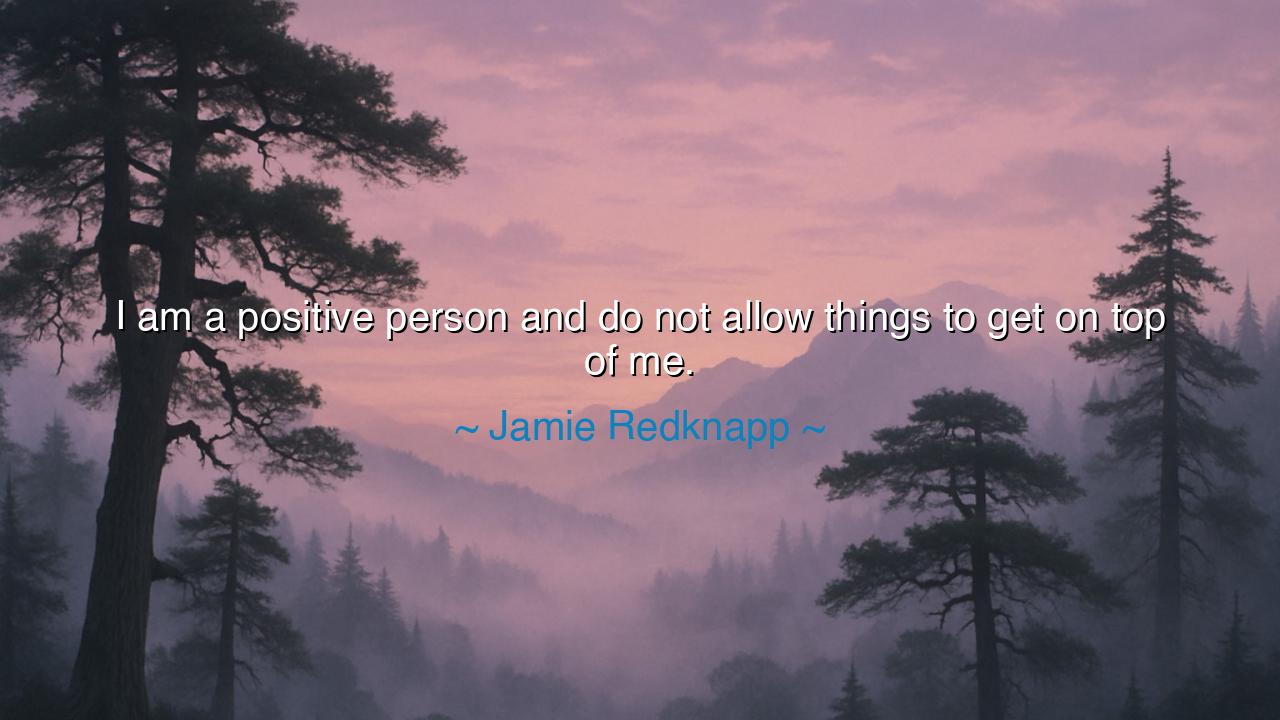
I am a positive person and do not allow things to get on top of






Jamie Redknapp once declared with the simplicity of a warrior’s creed: “I am a positive person and do not allow things to get on top of me.” In these few words shines a shield of the spirit, a vow not to be crushed beneath the weight of sorrow, failure, or fear. It is the song of one who knows that life’s battles are not fought only with the body, but with the heart’s steadfastness. For when the storms of misfortune rage, only those who guard their positivity can stand upright, while others sink beneath the flood.
To be a positive person is to choose light even when surrounded by darkness, to lift one’s gaze when shadows beckon downward. It is not to deny the hardships of existence, but to refuse them mastery over the soul. Like the oak that bends but does not break in the wind, the positive spirit yields yet endures, carrying within it a secret strength greater than iron. Thus Redknapp’s words carry the wisdom of ages: that the greatest victories are often not seen in arenas or kingdoms, but within the hidden chambers of the human mind.
History, too, tells of such indomitable spirit. Consider Nelson Mandela, who endured twenty-seven years in prison, bound in chains, yet emerged not as a man broken, but as a beacon of hope. He refused to let despair “get on top” of him, and by guarding his inner flame, he became the fire that lit the path for a nation. His life, like Redknapp’s creed, reminds us that resilience is born not from circumstance, but from choice—the sacred choice to remain unbowed.
In these words also lies a call to future generations: when life hurls burdens upon your shoulders, remember that you may stand taller still. Do not let grief, failure, or envy settle upon you like stone upon the chest. Cast them off, as the athlete casts aside chains in training, for they do not define you. Instead, let positivity be your armor, let hope be your sword, and let serenity be your crown.
So, children of tomorrow, take heed of this teaching. The world will test you with fire and wave, with hardship and betrayal. But if you guard the fortress of your mind, if you do not allow things to “get on top” of you, you shall walk with freedom even in chains, with victory even in defeat. For the true hero is not the one who conquers kingdoms, but the one who conquers himself.






GDGold D.dragon
This quote from Jamie Redknapp raises an interesting question about the role of positivity in mental health. How do we cultivate a mindset that helps us handle stress without ignoring our emotional struggles? Does being a positive person mean suppressing feelings, or can it coexist with expressing vulnerability when necessary?
LMLe Minh
Jamie Redknapp's approach to positivity seems empowering, but can constant positivity prevent us from addressing important issues? Is there a risk in ignoring negative feelings, and should we allow ourselves to experience the full range of emotions before deciding how to move forward? What happens when being positive becomes a way to avoid facing difficult truths?
Llehoaiphuong
I admire how Jamie Redknapp claims to not let things get on top of him, but isn’t it difficult to stay positive all the time? How do we balance being positive with acknowledging when things are genuinely tough? Could it sometimes be harmful to deny negative feelings instead of addressing them directly?
TDBao Ngoc Tran Dang
Jamie Redknapp’s statement about being a positive person makes me wonder how often we really practice positive thinking. Is it possible to always maintain this attitude, especially when facing challenging situations? How do we prevent negativity from taking over, and can this mindset actually help with problem-solving in tough times?